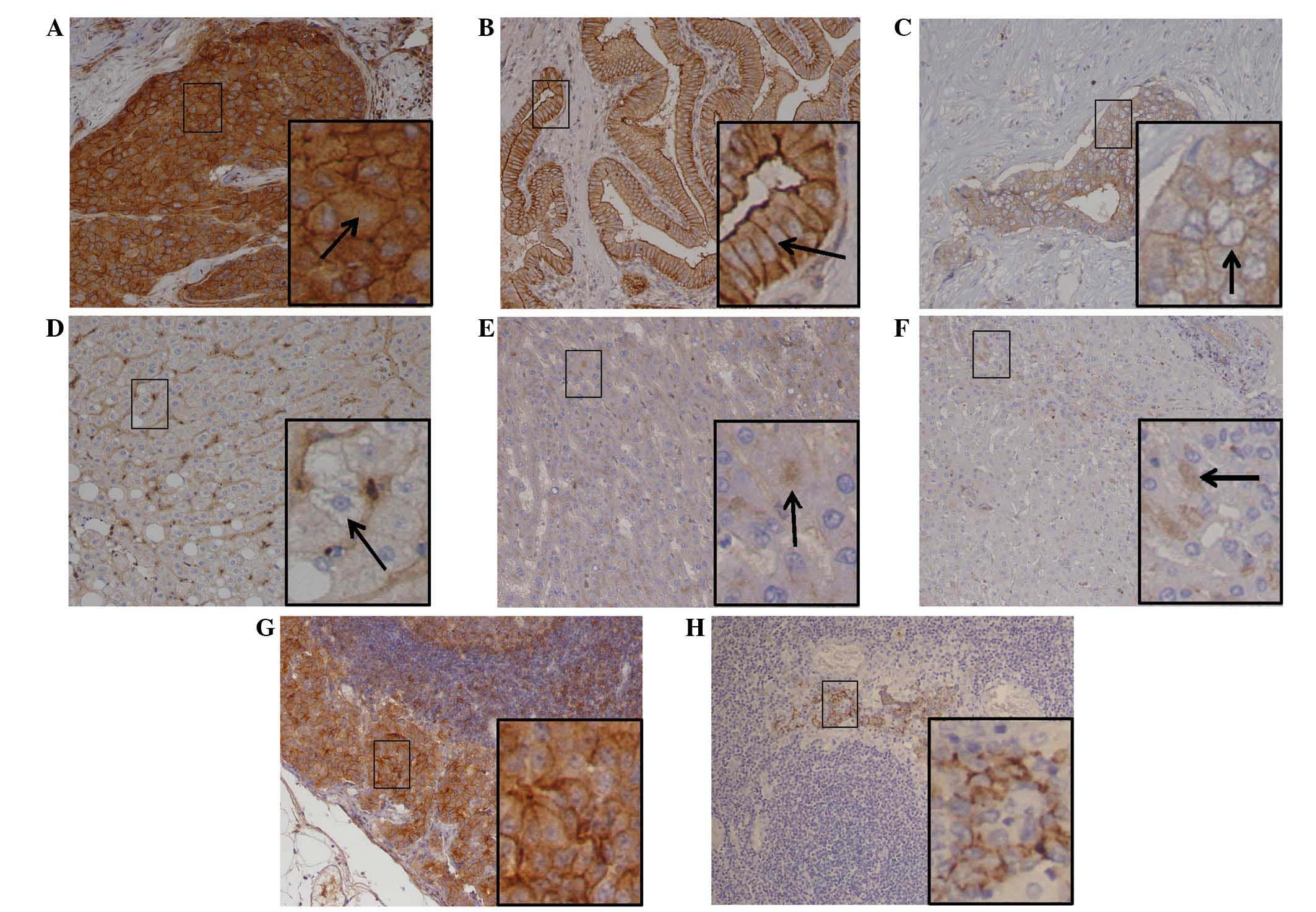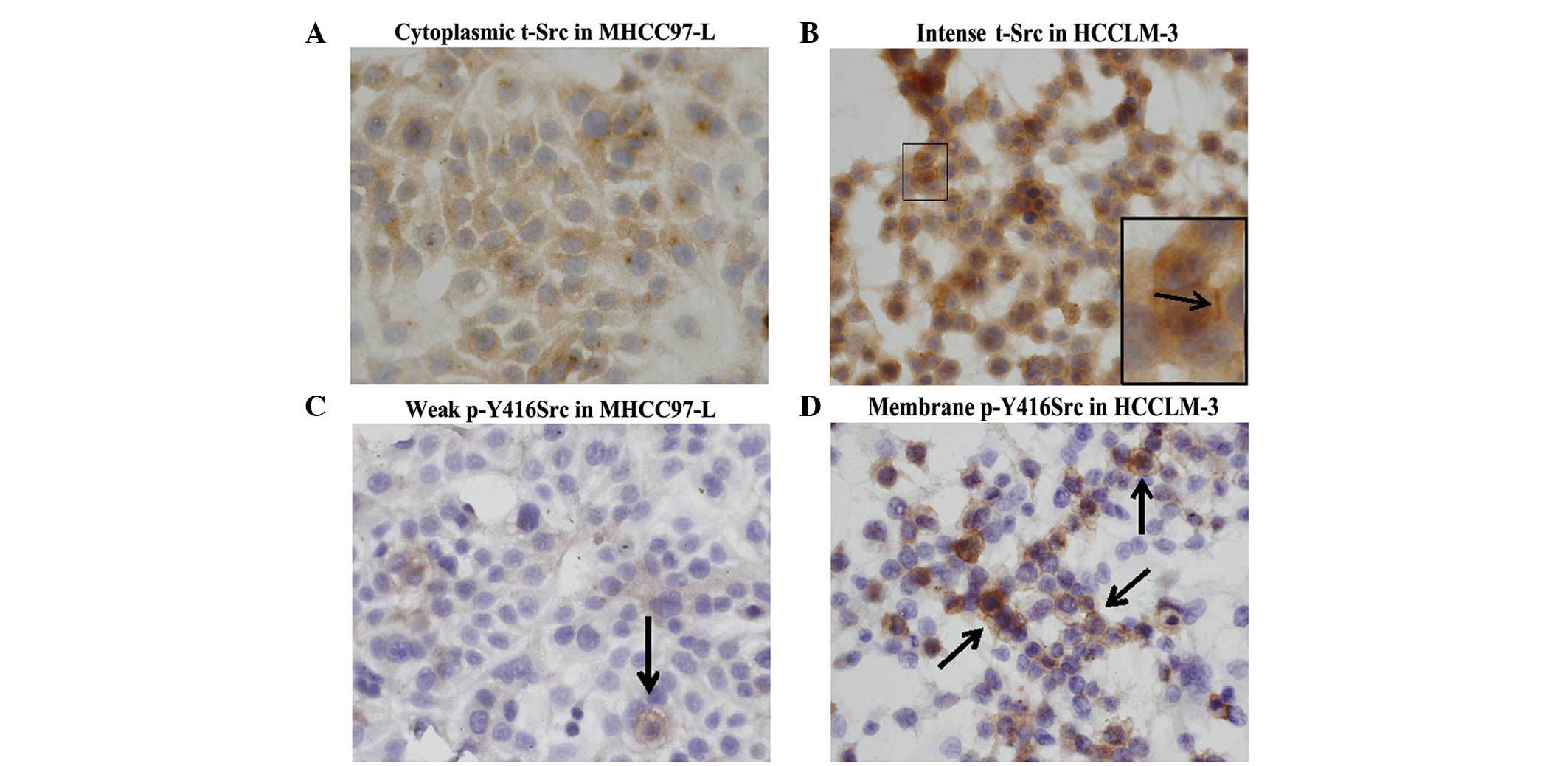|
1
|
Farazi PA and Depinho RA: The genetic and
environmental basis of hepatocellular carcinoma. Discov Med.
6:182–186. 2006.PubMed/NCBI
|
|
2
|
Parkin DM, Bray F, Ferlay J and Pisani P:
Global cancer statistic, 2002. CA Cancer J Clin. 55:74–108. 2005.
View Article : Google Scholar : PubMed/NCBI
|
|
3
|
He J, Gu D, Wu X, et al: Major causes of
death among men and women in China. N Engl J Med. 353:1124–1134.
2005. View Article : Google Scholar : PubMed/NCBI
|
|
4
|
Hussain SA, Ferry DR, El-Gazzaz G, Mirza
DF, James ND, McMaster P and Kerr DJ: Hepatocellular carcinoma. Ann
Oncol. 12:161–172. 2001. View Article : Google Scholar : PubMed/NCBI
|
|
5
|
Shimizu I, Kohno N, Tamaki K, Shono M,
Huang HW, He JH and Yao DF: Female hepatology: Favorable role of
estrogen in chronic liver disease with hepatitis B virus infection.
World J Gastroenterol. 13:4295–4305. 2007.PubMed/NCBI
|
|
6
|
Tang Z, Zhou X, Lin Z, Yang B, Ma Z, Ye S,
Wu Z, Fan J, Liu Y, Liu K, et al: Surgical treatment of
hepatocellular carcinoma and related basic research with special
reference to recurrence and metastasis. Chin Med J (Engl).
112:887–891. 1999.PubMed/NCBI
|
|
7
|
Collett MS and Erikson RL: Protein kinase
activity associated with the avian sarcoma virus src gene product.
Proc Natl Acad Sci USA. 75:2021–2024. 1978. View Article : Google Scholar : PubMed/NCBI
|
|
8
|
Ingley E: Src family kinases: Regulation
of their activities, levels and identification of new pathways.
Biochim Biophys Acta. 56(65): 17842008.
|
|
9
|
Bolos V, Gasent JM, Lopez-Tarruella S and
Grande E: The dual kinase complex FAK-Src as a promising
therapeutic target in cancer. Onco Targets Ther. 3:83–97. 2010.
View Article : Google Scholar : PubMed/NCBI
|
|
10
|
Frame MC: Src in cancer: Deregulation and
consequences for cell behaviour. Biochim Biophys Acta.
1602:114–130. 2002.PubMed/NCBI
|
|
11
|
Yeatman TJ: A renaissance for SRC. Nat Rev
Cancer. 4:470–480. 2004. View
Article : Google Scholar : PubMed/NCBI
|
|
12
|
Chen J: Is Src the key to understanding
metastasis and developing new treatments for colon cancer? Nat Clin
Pract Gastroenterol Hepatol. 5:306–307. 2008. View Article : Google Scholar : PubMed/NCBI
|
|
13
|
Masaki T, Okada M, Shiratori Y, Rengifo W,
Matsumoto K, Maeda S, Kato N, Kanai F, Komatsu Y, Nishioka M and
Omata M: pp60c-src activation in hepatocellular carcinoma of human
and LEC rats. Hepatology. 27:1257–1264. 1998. View Article : Google Scholar : PubMed/NCBI
|
|
14
|
Sun CK, Man K, Ng KT, Ho JW, Lim ZX, Cheng
O, Lo CM, Poon RT and Fan ST: Proline-rich tyrosine kinase 2 (Pyk2)
promotes proliferation and invasiveness of hepatocellular carcinoma
cells through c-Src/ERK activation. Carcinogenesis. 29:2096–2105.
2008. View Article : Google Scholar : PubMed/NCBI
|
|
15
|
De Toni EN, Thieme SE, Herbst A, Behrens
A, Stieber A, Jung A, Blum H, Göke H and Kolligs FT: OPG is
regulated by beta-catenin and mediates resistance to TRAIL-induced
apoptosis in colon cancer. Clin Cancer Res. 14:4713–4718. 2008.
View Article : Google Scholar : PubMed/NCBI
|
|
16
|
Tian J, Tang ZY, Ye SL, Liu YK, Lin ZY,
Chen J and Xue Q: New human hepatocellular carcinoma (HCC) cell
line with highly metastatic potential (MHCC97) and its expressions
of the factors associated with metastasis. Br J Cancer. 81:814–821.
1999. View Article : Google Scholar : PubMed/NCBI
|
|
17
|
Li Y, Tian B, Yang J, Zhao L, Wu X, Ye SL,
Liu YK and Tang ZY: Stepwise metastatic human hepatocellular
carcinoma cell line model system with multiple metastatic
potentials establish through consecutive in vivo selection
and studies on metastatic characteristics. J Cancer Res Clin Oncol.
130:460–468. 2004. View Article : Google Scholar : PubMed/NCBI
|
|
18
|
National Comprehensive Cancer Network.
NCCN Clinical Practice Guidelines in Oncology: Hepatobiliary
cancers. Version 2. 2012.http://www.nccn.org/professionals/physician_gls/pdf/hepatobiliary.pdfAccessed.
August 27–2015
|
|
19
|
Ryder SD: British Society of
Gastroenterology: Guidelines for the diagnosis and treatment of
hepatocellular carcinoma (HCC) in adults. Gut. 52(Suppl 3):
iii1–iii8. 2003.PubMed/NCBI
|
|
20
|
Greene FL, Page DL, Fleming ID, Fritz A,
Balch CM and Haller DG: Liver Staging Form. AJCC Cancer Staging
Manual (6th). (New York). Springer-Verlag. 1312002.
|
|
21
|
Wu Y, Wang T, Ye S, Zhao R, Bai X, Wu Y,
Abe K and Jin X: Detection of hepatitis B virus DNA in
paraffin-embedded intrahepatic and extrahepatic cholangiocarcinoma
tissue in the northern Chinese population. Hum Pathol. 43:56–61.
2012. View Article : Google Scholar : PubMed/NCBI
|
|
22
|
Allred DC, Clark GM, Elledge R, Fuqua SA,
Brown RW, Chamness GC, Osborne CK and McGuire WL: Association of
p53 protein expression with tumor cell proliferation rate and
clinical outcome in node-negative breast cancer. J Natl Cancer
Inst. 85:200–206. 1993. View Article : Google Scholar : PubMed/NCBI
|
|
23
|
Lau GM, Lau GM, Yu GL, et al: Expression
of Src and FAK in hepatocellular carcinoma and the effect of Src
inhibitors on hepatocellular carcinoma in vitro. Dig Dis
Sci. 54:1465–1474. 2009. View Article : Google Scholar : PubMed/NCBI
|
|
24
|
Morgan L, Nicholson RI and Hiscox S: SRC
as a therapeutic target in breast cancer. Endocr Metab Immune
Disord Drug Targets. 8:273–278. 2008. View Article : Google Scholar : PubMed/NCBI
|
|
25
|
Anbalagan M, Moroz K, Ali A, Carrier L,
Glodowski S and Rowan BG: Subcellular localization of total and
activated Src kinase in African American and Caucasian breast
cancer. PLoS One. 7:e330172012. View Article : Google Scholar : PubMed/NCBI
|
|
26
|
Ito Y, Kawakatsu H, Takeda T, Sakon M,
Nagano H, Sakai T, Miyoshi E, Noda K, Tsujimoto M, Wakasa K, et al:
Activation of c-src gene product in hepatocellular carcinoma is
highly correlated with the indices of early stage phenotype. J
Hepatol. 35:68–73. 2001. View Article : Google Scholar : PubMed/NCBI
|
|
27
|
Chen ML, Chai CY, Yeh KT, Wang SN, Tsai
CJ, Yeh YT and Yang SF: Crosstalk between activated and inactivated
c-Src in hepatocellular carcinoma. Dis Markers. 30:325–333. 2011.
View Article : Google Scholar : PubMed/NCBI
|
|
28
|
Hunter T: A tail of two src's: Mutatis
mutandis. Cell. 49:1–4. 1987. View Article : Google Scholar : PubMed/NCBI
|
|
29
|
Roskoski R: Src protein-tyrosine kinase
structure and regulation. Biochem Biophys Res Commun.
324:1155–1164. 2004. View Article : Google Scholar : PubMed/NCBI
|

















